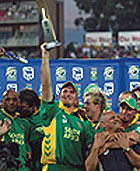|
The Greatest Match
When you score 434/4, you take a long shower, leaving the bowlers to finish the job, but as the Aussies discovered at the Wanderers, it ain’t over till it’s over
EMPIRE SPORTS BUREAU
|

|
|
|
| International sport frequently throws up surprises. What it rarely—if ever—does is throw up performances and events of such improbability that they simply defy belief. That, however, is exactly what occurred at the Wanderers in Johannesburg on 12 March, 2006. Australia set South Africa a world-record 435 runs to win in 50 overs, and South Africa successfully achieved their goal.
There were stars of the show wherever you looked. Losing captain Ricky Ponting, whose 164 was as breathtaking as it was powerful. Mike Hussey, who smashed 81 off 51 balls. Protea skipper Graeme Smith, whose 90 off only 55 balls laid the foundation for the miracle chase. Aussie left-armer Nathan Bracken, who took five of the thirteen wickets to fall on the day. Mark Boucher, who kept his head in the last over to smash Brett Lee for four and win the game. All of these efforts, however, paled in comparison to the Herculean achievement of Herschelle Gibbs, who pulverised the Australian bowling attack to finish with 175. Gibbs’ onslaught was the continuation of a trend that lasted all day—a trend of wild and violent strokeplay that bordered on the sadistic. |
|
|
|
|
And when Lee returned for the final over of a truly wonderful spectacle, South Africa needed only seven runs. With two more than capable batsmen at the crease, in Andrew Hall and ‘keeper Mark Boucher, South Africa were
favourites. Boucher grabbed a single from the first ball of the final over, bringing Hall on strike. Lee steamed in, bowled—and Hall calmly stroked him through the leg-side for a welcome boundary. |
|
|
Next ball, Hall decided to chip Lee over midwicket—only, he failed. The ball dropped straight into the hands of Michael Clarke at mid-on, and South Africa’s ninth wicket had fallen. Out stepped number 11 Makhaya Ntini for the most important moment of his batting career. Three balls, two runs. Lee steamed in again, and delivered a quick ball outside Ntini’s off-stump - and the fast bowler eased it down to third man for a single. The scores were equal.
Two balls, one run. Boucher on strike. Lee could not afford a bad ball—indeed, he could not afford anything other than a great ball. Yorker? Bouncer? Length ball? Lee’s mind must’ve raced. The runup began—three seconds later, the ball was racing away towards the mid-on fence. South Africa had won. The impossible had happened. A team had scored 434 runs in 50 overs, and then another team had come along and scored more. South African fans cried with joy—Australian fans cried.
The greatest ODI of all time was over. South Africa had exorcised the ghost of their World Cup semi-final defeat in 1999. Australia had thrown away a seemingly unassailable, record-breaking position. 872 runs had been scored in 99.5 overs of cricket.
Every now and again, international sport throws up something simply glorious. At the Wanderers, that evening, there were wonderers and wonderers.
|
GREAT COMEBACK
The English showed plenty of spunk to whip the Indians in the final Test at Mumbai and square the series. The man who lived up to his reputation as a dangerous match-winner was England skipper Freddie Flintoff
More...
|
|
|
|
April 2006
|
|

|
|
|
|